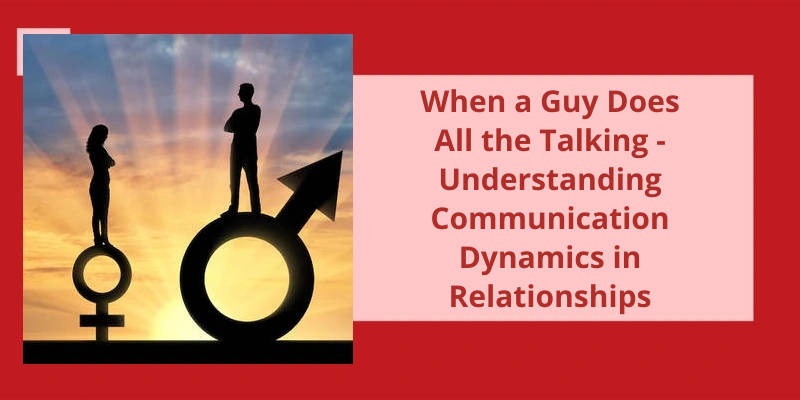In the realm of dating and relationships, communication dynamics play a crucial role in understanding and building a connection with your potential partner. However, there are instances when one party, particularly men, seem to dominate the conversation by doing all the talking. This phenomenon raises intriguing questions about it’s underlying motivations and implications. While it might be tempting to attribute this behavior solely to a man's personality, it’s important to delve deeper and explore the intricate intricacies that potentially underlie such an approach. Perhaps, when a guy does all the talking during a date, it could be a manifestation of a primal instinct to capture your attention and showcase his worthiness, much like a bird flaunting it’s brightly colored plumage to attract a mate. However, it’s crucial to decipher whether this verbose behavior stems from genuine interest, self-centeredness, or even manipulative intentions, as understanding the nuances can empower individuals to navigate the complexities of communication dynamics in relationships more effectively.
How Do You Know a Guy Enjoys Talking to You?
When it comes to understanding communication dynamics in relationships, it’s important to pay attention to various cues and signals. One such cue that can indicate a guys interest in talking to you is body language. According to experts, if a guy leans towards you during a conversation, it’s often a positive sign. People tend to naturally lean in towards those they like or feel comfortable with. So if the guy you’re interested in leans his face closer to yours while talking or listening, it can be a strong indication that he enjoys conversing with you.
Another way to gauge a guys enjoyment of talking to you is to observe his enthusiasm and engagement. Does he actively participate in the conversation? Does he ask follow-up questions or show genuine interest in what you’ve to say? If the answer is yes, it could mean that he genuinely enjoys talking to you and values your thoughts and opinions.
Additionally, consider the quality of the conversation itself. Does the guy put effort into keeping the conversation going or finding common interests to discuss? Does he share personal stories or experiences with you? A guy who enjoys talking to you’ll likely make an effort to ensure that the conversation is meaningful and enjoyable for both parties.
Furthermore, pay attention to how often the guy initiates conversations with you. Does he reach out to talk to you frequently? If he consistently takes the initiative to start conversations or engage in communication, it’s a strong indication that he enjoys talking to you and values your presence.
Lastly, consider if the guy actively listens to you and remembers details from your previous conversations. This can include recalling something significant you mentioned or remembering your likes and dislikes. When someone enjoys talking to you, they’re likely to actively listen and remember information because they genuinely care about getting to know you better.
Remember, everyone communicates differently, so it’s crucial to consider the context and individual differences when interpreting these signals.
Verbal Cues That Indicate a Guy Enjoys Talking to You
Verbal cues can provide valuable insights into a guy’s interest and enjoyment when talking to you. Some indicators include engaging in active and animated conversation, expressing genuine enthusiasm, asking questions to keep the dialogue flowing, and maintaining good eye contact. These cues demonstrate that the guy is genuinely interested in what you’ve to say and values your communication. However, it’s important to remember that communication dynamics can vary between individuals, so it’s essential to consider other non-verbal cues and context when assessing someone’s feelings and intentions.
During this time, individuals can gauge compatibility, shared interests, and potential chemistry without the pressure of a formal commitment. The talking stage isn’t to be mistaken for a mere friendship, as it often entails romantic undertones and a mutual interest in pursuing a deeper connection. So, what exactly does this new label signify, and how does it shape modern relationships? Let’s delve further into the intricacies of the talking stage and unravel it’s significance in today’s dating landscape.
Is It a Talking Stage or a Friendship?
Is it a talking stage or a friendship? Todays young people have a newer label: the “talking stage”. It happens between being introduced to someone and officially dating, and it can involve talking or texting for days – even months. The purpose of this stage is to have the opportunity to get to know someone before committing to a relationship with them.
During the talking stage, individuals engage in conversations to explore common interests, values, and goals. It allows both parties to determine if they’re compatible and if there’s potential for a deeper connection. This stage is characterized by open and honest communication, as individuals share their thoughts, opinions, and experiences.
However, it can sometimes be difficult to discern whether the talking stage is simply a friendship or the beginning of a romantic relationship. While the intention may be to keep things casual, emotions can unexpectedly develop, blurring the lines between friendship and romance.
Understanding communication dynamics is crucial in navigating the talking stage. It’s important to be mindful of your own feelings and intentions and to communicate them openly with the other person. Clarity and honesty are key in avoiding misunderstandings and potential heartache.
In the talking stage, it’s also important to consider the level of effort put into the conversations. Is it just one person doing all the talking while the other listens passively? If so, it may indicate an imbalance in the relationship dynamics. Mutual engagement in conversations is essential for building a strong foundation for a potential relationship.
It allows individuals to assess compatibility and establish a deeper connection before committing to a relationship.
Signs That the Talking Stage Is Transitioning Into a Romantic Relationship
There are several signs that can indicate that the talking stage is transitioning into a romantic relationship. Firstly, if the conversations become more personal and intimate, with both parties sharing their thoughts, feelings, and experiences on a deeper level, it could suggest a shift towards a romantic connection.
Secondly, if there’s an increase in affectionate gestures or expressions of interest, such as holding hands, hugging, or kissing, it’s likely that the relationship is becoming more romantic.
Additionally, if both individuals start making future plans together, whether it’s discussing upcoming events or trips, it suggests that they see each other as more than just friends.
Lastly, if there’s a mutual agreement to be exclusive or a conversation about labeling the relationship, it signifies a transition from the talking stage to a committed romantic relationship.
He genuinely enjoys your company and values the conversations you’ve together. This could indicate that he’s interested in building a deeper connection and getting to know you better.
What Does It Mean if a Guy Enjoys Talking to You?
When a guy enjoys talking to you, it simply means that he finds you interesting and relatable. It indicates that he genuinely wants to engage in conversations with you and values your thoughts and opinions. This type of dynamic in communication can be a strong indication that there’s a connection forming between the two of you.
When a guy takes the initiative to do most of the talking, it shows that he’s comfortable expressing himself and sharing his thoughts and experiences with you. This level of openness and vulnerability suggests that he trusts you and feels a sense of familiarity in your interactions.
It’s important to note that communication dynamics may vary from person to person and can depend on individual personalities and relationship dynamics. While some guys may be naturally talkative and enjoy sharing their thoughts, others may be more reserved or prefer to listen. It’s essential to respect and appreciate each others communication preferences to maintain a healthy balance in the relationship.
It’s a positive sign that indicates a potential for a meaningful connection and a strong foundation for a healthy relationship built on mutual understanding and effective communication.
How to Express Your Own Thoughts and Opinions When the Guy Enjoys Talking in Conversation.
- Listen actively and attentively to what the guy is saying.
- Acknowledge his viewpoints and show respect for his opinions.
- Ask open-ended questions to encourage him to share more of his thoughts.
- Share your own perspective in a calm and thoughtful manner.
- Avoid interrupting or dominating the conversation.
- Use “I” statements to express your thoughts and feelings instead of making generalizations.
- Bring up related topics that interest you and encourage a balanced discussion.
- Practice active listening techniques like summarizing his points to ensure mutual understanding.
- Be patient and understanding if he tends to talk more than you.
- Choose the right moment to express your thoughts without sounding confrontational.
Source: What does it mean when a guy says he likes talking… – Fishbowl
Conclusion
In conclusion, understanding communication dynamics in relationships is crucial when analyzing the scenario of "when a guy does all the talking". While it’s true that some men may use excessive talking on a date as a means to grab attention, it’s essential to consider that this behavior might not necessarily reflect their true personality. Instead, it can be seen as a tactic for demonstrating their attributes and attempting to impress their partner. By recognizing this potential motive, individuals can navigate dating situations with a greater understanding of the underlying dynamics at play. It’s important to maintain open and honest communication with one another, establishing a foundation for genuine connection and compatibility beyond initial impressions.






